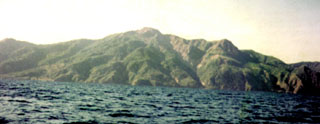Report on Paluweh (Indonesia) — 14 November-20 November 2012
Smithsonian Institution / US Geological Survey
Weekly Volcanic Activity Report, 14 November-20 November 2012
Managing Editor: Sally Sennert.
Please cite this report as:
Global Volcanism Program, 2012. Report on Paluweh (Indonesia) (Sennert, S, ed.). Weekly Volcanic Activity Report, 14 November-20 November 2012. Smithsonian Institution and US Geological Survey.
Paluweh
Indonesia
8.32°S, 121.708°E; summit elev. 875 m
All times are local (unless otherwise noted)
Based on analysis of satellite imagery, the Darwin VAAC reported that during 14-19 November ash plumes from Paluweh rose to altitudes of 2.4-3 km (8,000-10,000 ft) a.s.l. and drifted 45-150 km NW and W. A thermal anomaly was detected on 14 November.
Geological Summary. Paluweh volcano, also known as Rokatenda, forms the 8-km-wide island of Palu'e north of the volcanic arc that cuts across Flores Island. The broad irregular summit region contains overlapping craters up to 900 m wide and several lava domes. Several flank vents occur along a NW-trending fissure. The largest historical eruption occurred in 1928, when strong explosive activity was accompanied by landslide-induced tsunamis and lava dome emplacement. Pyroclastic flows in August 2013 resulted in fatalities.

